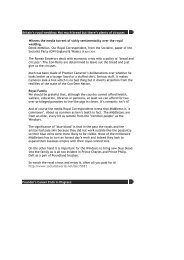Youth, Knowledge and Violence - Centre for Civil Society
Youth, Knowledge and Violence - Centre for Civil Society
Youth, Knowledge and Violence - Centre for Civil Society
You also want an ePaper? Increase the reach of your titles
YUMPU automatically turns print PDFs into web optimized ePapers that Google loves.
political <strong>and</strong> he compared the <strong>for</strong>tunes of the union under both the Babangida <strong>and</strong> Abacha regimes. He pointed out<br />
that:<br />
the state has been able to use more effective, suppressive <strong>and</strong> repressive<br />
measures <strong>and</strong> to explore <strong>and</strong> introduce all <strong>for</strong>ms of primordial sentiments in<br />
order to weaken <strong>and</strong> divide the union, the circumstances under Babangida are no<br />
longer those the country has to cope with under Abacha <strong>and</strong> you know it. 28<br />
So what this means is that academic freedom has become a mirage just as the principle of collective bargaining<br />
which was enshrined in the 1992 ASUU/Government agreement has been thrown of the winds. This is true even<br />
under a democratic dispensation. On a broader level, the weakening of the institutions of civil society has larger<br />
political implications <strong>and</strong> this of course provides an index of the complex nature of problems that would beset<br />
higher education in particular. Most of all the existing trade unions in the country have become more or less<br />
ineffectual due to government interference. And those that betray the merest signs of independence let alone<br />
opposition are usually proscribed by authoritarian regimes.<br />
At the beginning of this study, it was mentioned that Nigeria has about 37 “functional” universities. True,<br />
these universities continue to thrive in one <strong>for</strong>m or the other. Some will be able to adapt to the various onslaughts<br />
that the system has had to endure in the last couple of decades. And then, others would be infinitely worse under the<br />
impeding ruination. But in withst<strong>and</strong>ing some of the challenges of the times, novel coping strategies would have to<br />
be evolved.<br />
University of Lagos is one tertiary institution that has demonstrated imagination <strong>and</strong> verve in evolving<br />
some coping strategies. Professor Jelili Omotola, who became the institution’s Vice Chancellor in May 1995 visited<br />
the residential hostels <strong>and</strong> was appalled by the general sense of decay <strong>and</strong> acute shortage of water supply. He then<br />
embarked on a visit to the Federal Capital, Abuja to solicit <strong>for</strong> funding to combat the deplorable water situation.<br />
Four boreholes were sunk by the Federal government while the Federal Military of Water Resources provided two<br />
more.<br />
The Omotola administration also changed the system of awarding contracts <strong>and</strong> placed Professor Sulaiman<br />
Adekola, an electrical engineer at the helm of affairs. With this new system in place, the university was able to<br />
conserve more than 10 million naira. Electricity bills are now issued on the basis of a building’s orientation, that is,<br />
whether it is a residential household or else it is a commercial concern. Omotola challenged the academic<br />
community to submit proposals <strong>for</strong> viable projects <strong>and</strong> it responded positively. The university apart from venturing<br />
into soap making has started packaging <strong>and</strong> selling hygienically processed water to the general public. The<br />
commercial operation of car parks commenced in August, 1995. In just four months, Unilag Ventures, the unit<br />
controlling the university’s commercial interests made over 1.4 million naira. Furthermore, an arrangement<br />
whereby students can both study <strong>and</strong> work was initiated. Students can now do odd jobs, such as office cleaning,<br />
gardening <strong>and</strong> other menial assignments to earn their upkeep. But even this ingenuity has its drawbacks. Some<br />
critics have complained about the increasing rate of commercialization of the university which is something that<br />
erodes its academic character.<br />
Indeed the extent to which a university can generate the type of fundingg to trans<strong>for</strong>m its outlook depends<br />
on several factors <strong>and</strong> varies from location to location. Lagos as a commercial centre allows <strong>for</strong> such vigorous<br />
commercialization. Ogbomoso, which is a somewhat bustling rural town, on the other h<strong>and</strong>, would be less suitable.<br />
Obviously this factor would affect the geographies of funding. Furthermore, not all Vice Chancellors would have the<br />
kind of clout in government circles that Omotola possessed <strong>and</strong> not all of them would agree with his methods of<br />
generation of funding. What is required rather, are unequivocal pronouncements on educational policy that will deal<br />
with these issues. However, the growing liberalization of the public sector according to the conditionalities of<br />
Bretton Woods institutional order is quite apparent. In order to attract the necessary geographies of funding in line<br />
with current global dem<strong>and</strong>s various individual ef<strong>for</strong>ts (Omotola-type) appear sporadic <strong>and</strong> unsystematic may not<br />
change the course of events in a truly radical way.<br />
The “Gangstar” as Student<br />
Having attempted to present descriptions of <strong>for</strong>ms of transgression or ethnographies of violence at the<br />
general institutional level, we now also have to consider how students have faired, what kinds of violence are to be<br />
28 The Guardian on Saturday, June 7, 1997<br />
10
















